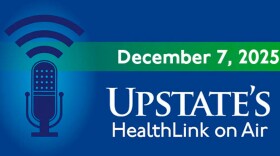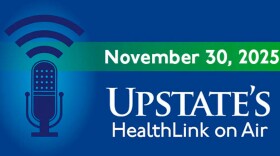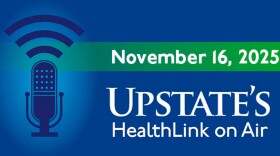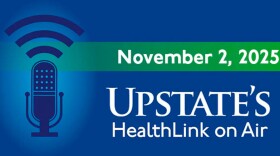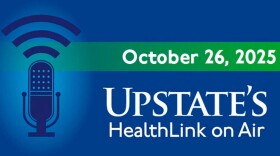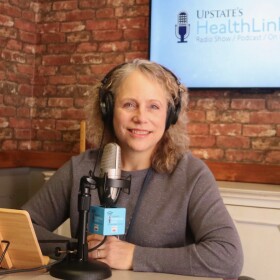
HealthLink on Air
Sundays at 6 a.m.
“HealthLink on Air” is a 60-minute program produced since 2006 by Upstate Medical University, the academic medical center in Syracuse, NY.
“HealthLink on Air” provides a weekly dose of information on health and medical issues affecting central New Yorkers. The program showcases health professionals and researchers from Upstate Medical University, Upstate University Hospital, the central New York community and those visiting the region who are involved with health care issues and events. The interviews are permanently archived online.
For more information, visit the HealthLink on Air website.
-
Learn about rising pediatric self-harm trends, the importance of Level 1 trauma centers, and new school-based mental health services on this episode of HealthLink on Air.
-
Anesthesiologist Susan Samudre discusses the various types of anesthesia. Orthopedic surgeon Eric Bellinger talks about minimally invasive foot and ankle surgeries. Physician assistant Robyn Chalupa explains the PA profession.
-
Cardiologist Andrew Weinberg and vascular and interventional neurologist Hesham Masoud explain the role of atrial fibrillation in stroke, and how identifying and treating that irregular heart rhythm can reduce one's stroke risk. Neurosurgeon Haydn Hoffman talks about treating blood flow problems in the brain, including ischemic strokes and a rare condition called moyamoya. And nephrologist Michael Lioudis shares how to reduce your risk of kidney disease.
-
Doctoral candidate Aya Kobeissi discusses the role of oxytocin -- the "love hormone" -- in restoring lost empathy for some dementia patients. Dr. Joshua Steinberg and Norton College of Medicine student Shruti Venkatesh share their analysis of health claims on food packaging. Cancer researcher John Brognard talks about how he entered this field and what he finds so gratifying about it.
-
Dr. Kaushal Nanavati discusses medical concerns of Generation Z, those born between 1997 and 2012. Dr. Matthew Grier goes over concussion care. Exercise physiologist Carol Sames explains how the Body Roundness Index compares with the Body Mass Index.
-
Electrophysiologist Jorge Romero explains atrial fibrillation diagnosis and the plentiful treatment options. Psychologist Holly Vanderhoff goes over various career options in the field of mental health. Gynecologist Maureen Burke discusses whether estrogen is safe for women to take at menopause.
-
The Upstate Golisano Pediatric After Hours Care medical director, Dr. Phillip Mackewicz, advises what sorts of illnesses and injuries are best treated at After Hours, as the program relocates to downtown Syracuse, across the street from Upstate University Hospital. Exercise physiologist Carol Sames explains a study that shows how exercise fights breast cancer recurrence. Upstate's Norton College of Medicine student Michael Sun shares a paper he co-wrote about skin conditions that may arise with urologic cancers.
-
Psychiatrists Robert Gregory and Gita Ramamurthy explain a recovery model of therapy for suicidal patients that has shown lasting success. Pediatrician Winter Berry talks about the importance of families having enough diapers.
-
Physical therapist Ryan Martin discusses 'tech neck' injuries caused by the use of electronics. Dr. Zachary Shepherd goes over bug bite prevention and when to seek treatment. And lawyers Sarah Reckess and Suzette Meléndez share how the medical-legal partnership helps patients and students. And pediatrician Travis Hobart tells how to help a toddler fall asleep.
-
Psychiatrists Cecilia Zemanek and Nevena Radonjic discuss the use of antidepressants during pregnancy. Endocrinologist Tuncay Delibasi shares a stem cell-based treatment that can cure severe forms of type 1 diabetes. Nurse Mary Ellen Sheridan discusses what to expect from childhood surgery. Registered dietitian nutritionist Heather Dorsey talks about savoring the foods of fall.




